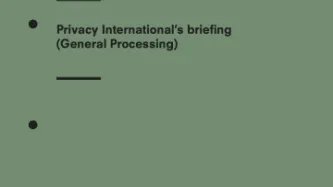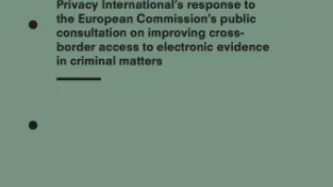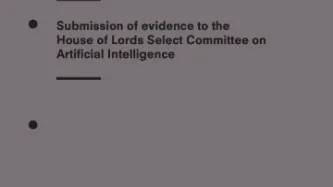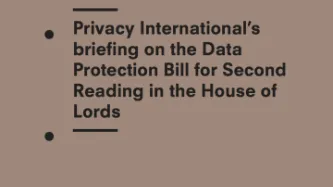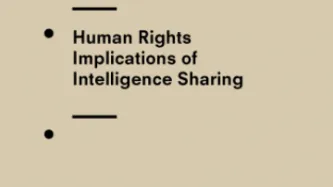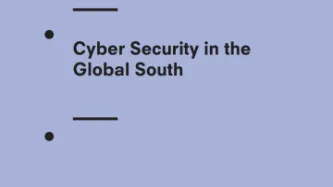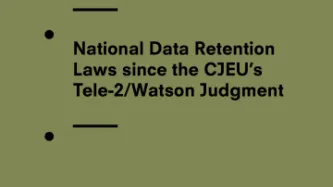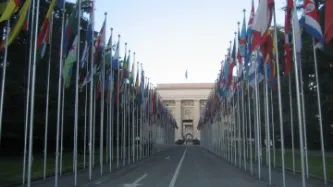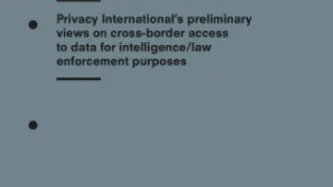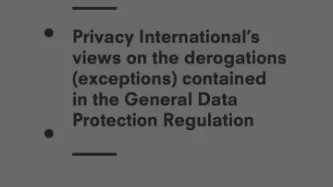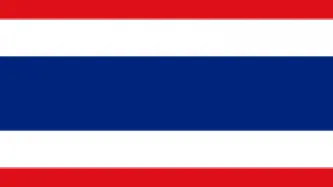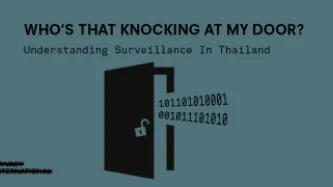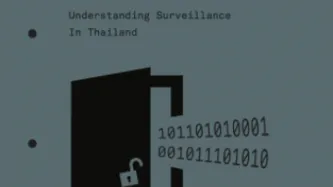Advanced Search
Content Type: Report
The smart city market is booming. National and local governments all over the world expect their cities to become more efficient, more sustainable, cleaner and safer by integrating technology, increasing data generation and centralising data to provide better services. From large multinationals to small start-ups, companies want their slice of the multi-billion dollars per year pie of municipal budgets and long-term government contracts.
But do smart cities even exist? And are our cities…
Content Type: News & Analysis
October 31st 2017 will mark the 3rd World Cities Day (we will forgive if you did not know that), with the general theme “Better City, Better Life.” On this date, PI will be launching its latest report “Smart Cities: Utopian Vision, Dystopian Reality”. This is an opportunity for us to ask: who exactly are our cities going to become better for?
Technology is often given as an answer when we are not sure what the question is. Cities are no exception to that. The current…
Content Type: Advocacy
On 23 October 2017, Privacy International contributed to the public consultation of the European Commission on improving cross border access to electronic evidence for criminal investigation. The consultation raises important questions, particularly in relation to preserving human rights protection and safeguards as national police forces seek digital evidence in other jurisdictions.
The EU is not the only inter-governmental organisation seeking to address the complex jurisdictional…
Content Type: Advocacy
Privacy International wishes to raise serious concerns regarding the proposal to expand immigration records to include social media handles, associated identifiable information and search results. Specifically, in relation to the current request for comments Docket Number DHS 2017 0038, we object to the Department for Homeland Security proposal to update record source categories to include “publicly available information obtained from the internet”, “commercial data providers” and from “…
Content Type: Press release
Privacy International, in partnership with 30+ national human rights organisations, has today written to national intelligence oversight bodies in over 40 countries seeking information on the intelligence sharing activities of their governments.
Countries may use secret intelligence sharing arrangements to circumvent international and domestic rules on direct surveillance. These arrangements can also lead to the exchange of information that can facilitate human rights abuses,…
Content Type: Advocacy
Privacy International has today submitted comments to a U.S. government consultation on whether the US Department of Homeland Security (DHS) should keep the social media details of individuals travelling to the US in so-called “Alien Files” documenting all immigrants.
We’ve urged that they don’t, and that they review and stop all similar social media surveillance by the DHS.
The systematic surveillance of social media is an increasingly dangerous trend …
Content Type: Advocacy
Privacy International's response to the inquiry by the House of Lords Select Committee on Artificial Intelligence.
Content Type: Advocacy
Privacy International welcomes the aim of this Bill (Data Protection Bill), “to create a clear and coherent data protection regime”, and to update the UK data protection law, including by bringing the EU General Data Protection Regulation (GDPR) and the Data Protection Law Enforcement Directive (DPLED) - into the UK domestic system. This is Privacy International’s briefing on the Data Protection Bill for second reading in the House of Lords
Content Type: Press release
While welcoming the objective of the Bill, Privacy International has sent a briefing to the House of Lords and a letter to Minister of State for Digital, Matt Hancock MP, outlining key concerns and recommendations. The Bill's stated aim is “to create a clear and coherent data protection regime”, and to update the UK data protection law, including by bringing the EU General Data Protection Regulation (GDPR) and the Data Protection Law Enforcement Directive (DPLED) - into the UK domestic system.…
Content Type: News & Analysis
This blog was written by Fundación Karisma, a member of the Privacy International Network. It does not necessarily reflect the views or position of Privacy International.
The Colombian General Prosecutor said recently that the blocking of IMEI is not working. He is talking about a registry created in 2011 that aims to reduce cellphone theft by blocking reportedly stolen phones of Colombian networks.
Fundación Karisma has been following this program and now, after six years…
Content Type: Advocacy
On 13 September 2017, Privacy International, in partnership with 30+ national human rights organisations, launched an international campaign for greater transparency around secretive intelligence sharing activities between governments. As part of this campaign, PI wrote to national intelligence oversight bodies in over 40 countries seeking information about the intelligence sharing activities of their governments. PI has created an interactive map which illustrates the countries…
Content Type: Report
In this paper, Privacy International explores* what it means to be secure, and how governments and companies enact policies and laws that undermine security globally. Good cyber security policies and practices put people and their rights at the centre. By prioritising the individual and protecting people, devices and networks, governments could take advantage of a real opportunity - to give something technically complex a human element. In short, giving the tin man a heart.
*This…
Content Type: Press release
Key points
Privacy International surveyed 21 EU member states' legislation on data retention and examined their compliance with fundamental human rights standards
0 out of the 21 States examined by PI are currently in compliance with these standards (as interpreted in two landmark judgements by the Court of Justice of the European Union: Tele-2/Watson and Digital Rights Ireland)
Privacy International is calling for:
EU member states to review their legislation on data retention…
Content Type: Advocacy
This report sheds light on the current state of affairs in data retention regulation across the EU post the Tele-2/Watson judgment. Privacy International has consulted with digital rights NGOs and industry from across the European Union to survey 21 national jurisdictions (Austria, Belgium, Bulgaria, Croatia, Cyprus, Czech Republic, France, Germany, Hungary, Ireland, Italy, Luxembourg, the Netherlands, Poland, Portugal, Romania, Slovakia, Slovenia, Spain, Sweden, and the United…
Content Type: Advocacy
Privacy International and Metamorphosis have today written to authorities in Macedonia to provide information and call for assurances regarding government surveillance in Macedonia.
For over two years, Macedonia has endured a prolonged and severe political crisis - including wide scale protests and acts of violence against parliamentarians - following reports that the governing party had been unlawfully intercepting the phone calls of some 20,000 people, including,…
Content Type: News & Analysis
What do Honduras, Pakistan, and Switzerland have in common? They are all bound to respect and protect the right to privacy under Article 17 of the International Covenant on Civil and Political Rights. And in July 2017, they all also happened to be under the scrutiny of the UN Human Rights Committee, which found the countries’ human rights record wanting in many respects, including the scope of their surveillance legislation.
Intelligence sharing
Reviewing Pakistan, the Committee…
Content Type: Long Read
6 July 2017
Full briefing: UK-US Intelligence Sharing Arrangements
Urgent transparency is needed regarding the UK’s intelligence sharing arrangements with the United States, which allows UK and US agencies to share, by default, any raw intelligence and methods and techniques related to the acquisition of such intelligence. In a recent YouGov poll, three quarters of Britons said that they want the UK Government to tell the public what safeguards govern these arrangements. Privacy…
Content Type: News & Analysis
The Privacy International Network recently submitted joint stakeholder reports for seven partner countries - India, South Africa, Morocco, Tunisia, Brazil, the Philippines and Indonesia - as part of the 27th session of the Universal Periodic Review (1 to 12 May 2017).
Communications surveillance was a major area of concern, as we observed that these policies and practices remain largely opaque, complex and vague. In…
Content Type: Advocacy
Privacy International welcomes this opportunity to engage in a dialogue over the implementation of the UN Security Council Resolution 2322 (2016), specifically as they related to intelligence sharing and mutual legal assistance mechanisms to access cross-border data.
Content Type: Advocacy
Privacy International welcomes the willingness of the UK government to implement the EU General Data Protection Regulation (GDPR), which provides stronger standards of protection of personal data to those contained in the EU Directive 1995, whose provisions were implemented in the Data Protection Act 1998. Improved rights and enforcement measures will generate greater trust and therefore greater engagement in the digital environment, which will in turn benefit the economy. …
Content Type: Report
This investigation focuses on the techniques, tools and culture of Kenyan police and intelligence agencies’ communications surveillance practices. It focuses primarily on the use of surveillance for counterterrorism operations. It contrasts the fiction and reality of how communications content and data is intercepted and how communications data is fed into the cycle of arrests, torture and disappearances.
Communications surveillance is being carried out by Kenyan state actors, essentially…
Content Type: State of Privacy
Introduction
Acknowledgment
The State of Surveillance in Thailand is the result of a collaboration by Privacy International and Thai Netizen Network.
Right to Privacy
The constitution
Thailand experienced a coup d'etat in May 2014. According to Mishari Muqbil and Arthit Suriyawongkul, “their [the junta's] modus operandi seems to be the direct command of ministries and semi-governmental organisations to carry out tasks irrespective of existing legislation.”
Following…
Content Type: News & Analysis
This guest piece was written by Elonnai Hickok, Amber Sinha and Vanya Rakesh of the Centre for Internet and Society. It does not necessarily reflect the views or position of Privacy International.
In 2009, the Government of India set up the Unique Identification Authority of India (UIDAI) as an attached office of the erstwhile Planning Commission of India via an executive order. The mandate of the UIDAI was to assign a 12-digit unique identification (UID) number (…
Content Type: News & Analysis
An investigation released by Privacy International this week reveals the Facebook shut-down Thailand experienced in May 2014, at the height of the military coup, may have had more to do with attempting to surveil online communications, rather than censoring Facebook users. This revelation indicates there could be more to other previous internet shutdowns that have happened during times of political unrest.
In May 2014, following months of protest, the Thai military overthrew the…
Content Type: Report
This investigation looks at how surveillance is being conducted in Thailand. The first part of the investigation focuses on the ties between telecommunication companies and the state, and the second part of the investigation focuses on attacks conducted in order to attempt to circumvent encryption.
Content Type: Long Read
In July 2015, representatives of a private company met in a parking lot in Pretoria, South Africa to sell phone tapping technology to an interested private buyer. What they did not know was that this buyer was a police officer. The police had been tipped off that the company was looking to offload the surveillance technology, an IMSI catcher, to anyone who would buy it. It is illegal to operate such surveillance technology as a private citizen in South Africa, and illegal to buy…
Content Type: Report
Privacy International’s investigation contains evidence of the Syrian government’s ambitious plans and projects to monitor the national communications infrastructure, the technical details of which are revealed for the first time. Hundreds of original documents also highlight surveillance trade in this region leading up to and during the Arab Spring, which involved companies from around the world.
Content Type: Press release
This week in Geneva, the UN Human Rights Committee will examine Colombia’s compliance with the International Covenant on Civil and Political Rights (ICCPR). This review, by a body of independent experts charged with monitoring compliance with the ICCPR, comes just weeks after the peace deal between President Juan Manuel Santos and Farc leader Timoleon Jimenez was rejected by voters and months after it was revealed that an investigative journalist was put under surveillance by the Colombian…
Content Type: Long Read
This report examines the emergence of social media based surveillance in Thailand, carried out potentially by people’s own networks of friends and family. It looks at the severe impact this has on personal privacy and points to potential solutions.
In May 2014, Thailand experienced a military coup – its second in eight years. A military government led by General Prayut Chan-o-cha seized power and overthrew the administration of Prime Minister Yingluck Shinawatra. The Army declared martial…


